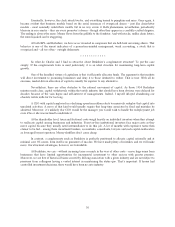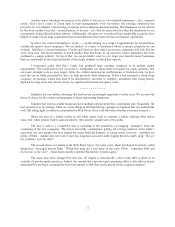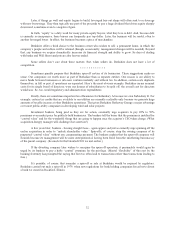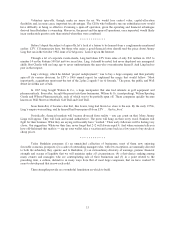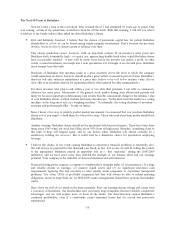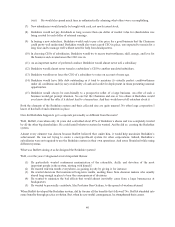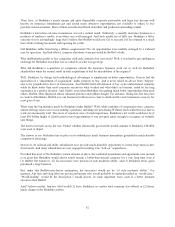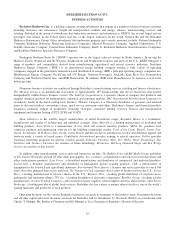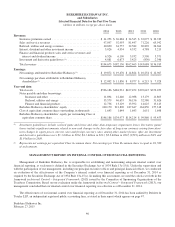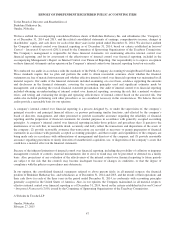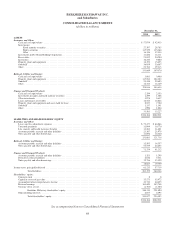Berkshire Hathaway 2014 Annual Report Download - page 41
Download and view the complete annual report
Please find page 41 of the 2014 Berkshire Hathaway annual report below. You can navigate through the pages in the report by either clicking on the pages listed below, or by using the keyword search tool below to find specific information within the annual report.Vice Chairman’s Thoughts – Past and Future
To the shareholders of Berkshire Hathaway Inc.:
I closely watched the 50-year history of Berkshire’s uncommon success under Warren Buffett. And it now seems
appropriate that I independently supplement whatever celebratory comment comes from him. I will try to do five
things.
(1) Describe the management system and policies that caused a small and unfixably-doomed commodity
textile business to morph into the mighty Berkshire that now exists,
(2) Explain how the management system and policies came into being,
(3) Explain, to some extent, why Berkshire did so well,
(4) Predict whether abnormally good results would continue if Buffett were soon to depart, and
(5) Consider whether Berkshire’s great results over the last 50 years have implications that may prove useful
elsewhere.
The management system and policies of Berkshire under Buffett (herein together called “the Berkshire system”)
were fixed early and are described below:
(1) Berkshire would be a diffuse conglomerate, averse only to activities about which it could not make useful
predictions.
(2) Its top company would do almost all business through separately incorporated subsidiaries whose CEOs
would operate with very extreme autonomy.
(3) There would be almost nothing at conglomerate headquarters except a tiny office suite containing a
Chairman, a CFO, and a few assistants who mostly helped the CFO with auditing, internal control, etc.
(4) Berkshire subsidiaries would always prominently include casualty insurers. Those insurers as a group
would be expected to produce, in due course, dependable underwriting gains while also producing
substantial “float” (from unpaid insurance liabilities) for investment.
(5) There would be no significant system-wide personnel system, stock option system, other incentive system,
retirement system, or the like, because the subsidiaries would have their own systems, often different.
(6) Berkshire’s Chairman would reserve only a few activities for himself.
(i) He would manage almost all security investments, with these normally residing in Berkshire’s
casualty insurers.
(ii) He would choose all CEOs of important subsidiaries, and he would fix their compensation and
obtain from each a private recommendation for a successor in case one was suddenly needed.
(iii) He would deploy most cash not needed in subsidiaries after they had increased their competitive
advantage, with the ideal deployment being the use of that cash to acquire new subsidiaries.
(iv) He would make himself promptly available for almost any contact wanted by any subsidiary’s
CEO, and he would require almost no additional contact.
(v) He would write a long, logical, and useful letter for inclusion in his annual report, designed as he
would wish it to be if he were only a passive shareholder, and he would be available for hours of
answering questions at annual shareholders’ meetings.
(vi) He would try to be an exemplar in a culture that would work well for customers, shareholders,
and other incumbents for a long time, both before and after his departure.
(vii) His first priority would be reservation of much time for quiet reading and thinking, particularly
that which might advance his determined learning, no matter how old he became; and
39



